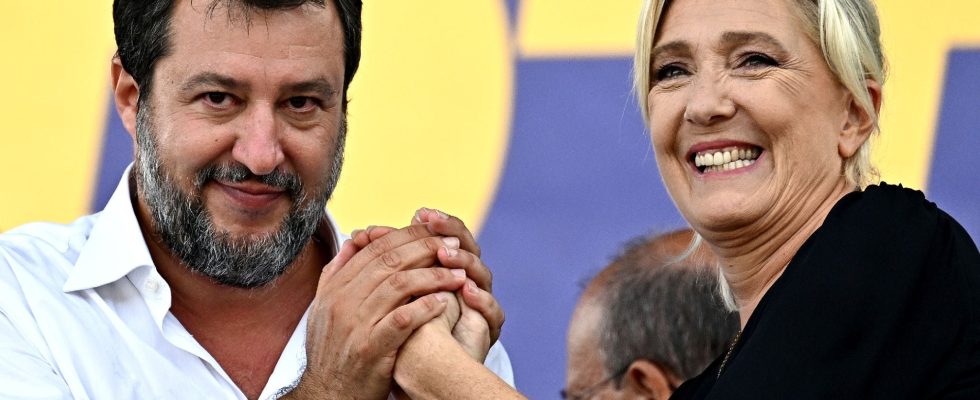The scene will have demonstrated, once again, how the far-right parties of the Old Continent do not give each other gifts, unlike other political families. During a rally of the League of her friend Matteo Salvini for the European elections at the beginning of June, on March 23, Marine Le Pen did not hesitate to question the current Italian leader, Giorgia Meloni. “Mrs Prime Minister, will you, yes or no, support a second term for Mrs von der Leyen [NDLR : présidente de la Commission, issue de la droite] “, launched the leading figure of the National Rally in a video message.
While their progress promises to be the most important in the European elections, national-populist movements may prove incapable of capitalizing on their success. But we should not exclude recompositions that are favorable to them either. This is what emerges froma new study from the Institut Montaigne. “There will not be a single set of national-populists, and the two big families could continue to experience significant divisions,” underlines one of the authors of the note, the political scientist Marc Lazar, professor emeritus at Sciences Po and at Luiss University in Rome.
Currently, the National Rally of Marine Le Pen, at the top of the European polls in France (around 30% of voting intentions), sits in the Identity and Democracy group (ID, 59 MEPs), with the Italian League, the Germans of the AfD, the Austrians of the FPÖ and the Flemish of Vlaams Belang. This group is considered a little more radical than that of the European Conservatives and Reformists (CRE, 68 elected), which includes, among others, Brothers of Italy, the post-fascist movement of Giorgia Meloni, the Poles of Law and Justice (PiS) , the Spanish Vox and the Sweden Democrats (with the misleading name). We can add to this family of ideas some currently unregistered movements such as the Hungarians of Fidesz.
On paper, these movements share certain strong ideas, likely to see them agree. All are calling for a “European Alliance of Nations” which they are setting up as an alternative model to the European Union, judging the Commission too political and European law incompatible with the principle of national sovereignty. But none would be ready to take their country out of the EU – at least initially – if they found themselves in power. All play on a certain hostility towards Islam and advocate a very firm policy towards immigration. All also reject the “Green Pact” supported by the Twenty-Seven.
“Arc of the rights”
However, notes the Montaigne Institute, “these connections outline the contours of a vast coalition of consrather than a very hypothetical project majority”. Behind a common “populist” rhetorical form, certain fundamental divergences persist, accentuated by the war in Ukraine. The members of the CRE, and in particular the party of Giorgia Meloni, reveal themselves very Atlanticist, while the RN, which has long maintained links with Vladimir Putin, does not rule out an exit from the integrated command of NATO. Within ID, if the RN and the League voted to support an increase in the production of European munitions and missiles, the AfD opposed it.
“The campaign also reveals a sort of competition to be the reference figure of national populists in Europe, between Marine Le Pen and Giorgia Meloni,” estimates Marc Lazar. It would be wrong, according to him, to conclude that the exercise of power would have “converted” the Italian leader to Europe. “With good results in the European elections, she could try to push her idea of a Europe where nations would have more space, also defended by Viktor Orban and Marine Le Pen,” he specifies. Part of the right of the PPE [NDLR : Parti populaire européen, premier groupe au Parlement] could try to seek agreements with CRE members on common themes concerning immigration or climate change.”
Among the various post-election scenarios mentioned by the Montaigne Institute, one foresees an “arc of the rights” if ID and the CRE agree to converge towards the EPP, in addition to non-registered groups like Viktor Orban’s Fidesz. A success of the national populists to the detriment of the EPP could push certain right-wing elected officials to be more open to dialogue. However, as the Montaigne Institute noted, ID has expressed its “desire to break the sanitary cordon in order to be able to cooperate with other groups, in particular by appointing deputies considered to be more respectable and, therefore, capable to influence the legislative process, both in committee and in plenary.”
“There is a nuance here between Marine Le Pen and Jordan Bardella, who seems more interested in finding points of convergence with Meloni, whose experience of bringing together the right in Italy can appear as a model,” points out Marc Lazar . It remains to be seen whether this desire to weigh in, once the election verdict is rendered, will be able to overcome certain fundamental differences.
.
